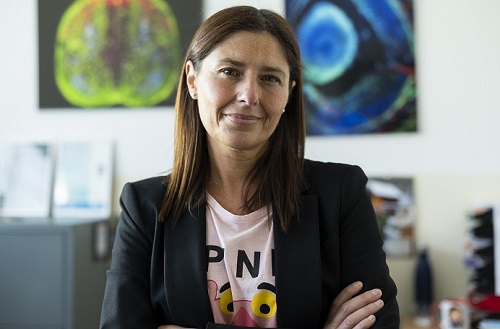Eloísa Herrera, the new president of the Spanish Society of Developmental Biology (SEBD)
19 de December de 2023
The researcher who runs the Generation and Regeneration of Bilateral Neural Circuits laboratory at the Institute for Neurosciences (IN), a joint center of the Spanish National Research Council (CSIC) and the Miguel Hernández University (UMH) of Elche, Eloísa Herrera González de Molina, has been elected new president of the Spanish Society of Developmental Biology (SEBD). The appointment took place at the SEBD Annual Assembly, held last Thursday, December 14, in which part of the board of directors has also been renewed.
 Eloísa Herrera has pointed out that this appointment is a great honor and at the same time a challenge that she takes on with great enthusiasm: “I want to express my sincere gratitude to the previous president, Fernando Casares, to the members of the board of directors and to all the partners for placing their trust in me”. And adds: “I am committed to carrying out my role in the most efficient way possible, serving this society with dedication and contributing to the continuous development of our different disciplines”.
Eloísa Herrera has pointed out that this appointment is a great honor and at the same time a challenge that she takes on with great enthusiasm: “I want to express my sincere gratitude to the previous president, Fernando Casares, to the members of the board of directors and to all the partners for placing their trust in me”. And adds: “I am committed to carrying out my role in the most efficient way possible, serving this society with dedication and contributing to the continuous development of our different disciplines”.
Furthermore, the researcher has emphasized the important role that the members of the SEBD play at a national and international level: “They lead advances in cutting-edge areas such as genomics, systems biology, evolution or regenerative medicine and, therefore, Therefore, it is an enormous privilege for me to assume the responsibility of the presidency”. “Working together with enthusiasm and commitment, we will achieve new goals and continue strengthening the position of the SEBD as a world reference in the field of developmental biology”, highlights Herrera.
The essential purpose of the SEBD is the promotion and dissemination of scientific knowledge in the field of Developmental Biology, as well as establishing communication links between the community of developmental biologists working in Spain and promoting their interaction with developmental biology societies from other countries. An example of this is its integration into the International Society for Developmental Biology (ISDB) and the many links established with the Portuguese, British, French, and American developmental biology societies.
Eloísa Herrera obtained her PhD while she was researching at the National Center for Biotechnology (Spain) and completed a postdoctoral stay at Columbia University (New York, USA), where she identified the molecular mechanisms underlying the emergence of binocular vision. The research she has carried out in her IN laboratory has contributed to understanding how bilateral symmetry emerged in evolution and to expanding knowledge about the regulatory mechanisms underlying the orientation and targeting processes of axons during the wiring of neural circuits.
She has received the Professional Development Award from the Human Frontiers Science Program, the Alberto Sols Award for the best scientific work, has coordinated the ‘Brain, Mind, and Behavior’ CSIC White Paper, and was deputy coordinator of the State Research Agency (AEI) - Neurosciences. She belongs to the editorial board of various scientific journals and is a member of several committees and evaluation panels for national and international agencies.
Source: Institute for Neurosciences CSIC-UMH (in.comunicacion@umh.es)

 Español
Español